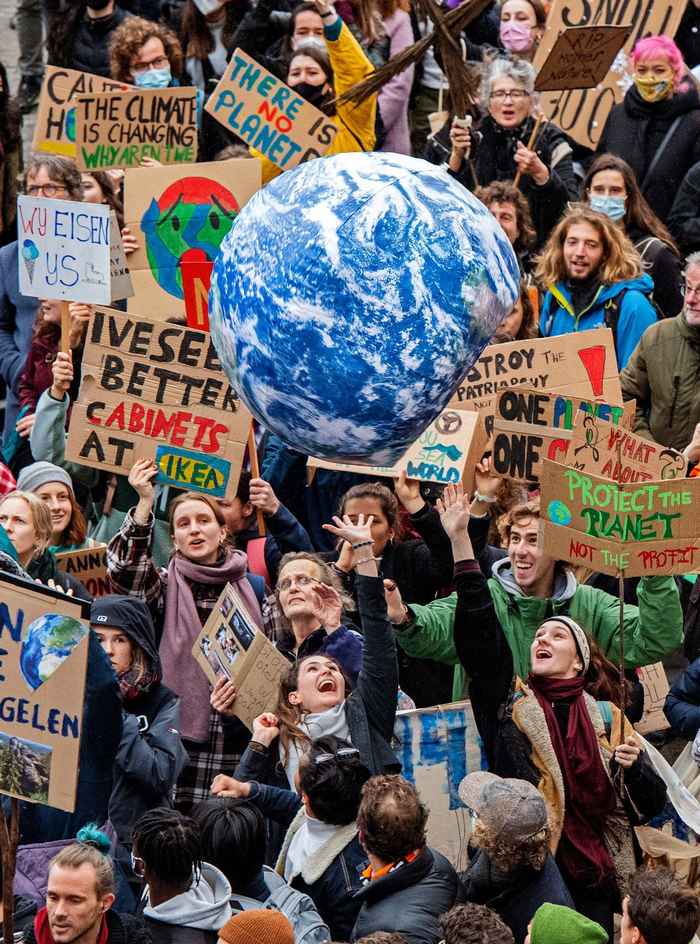Climate Action: From Local Movements to Global Change
- Date
- 4 June 2025
- Time
- 13:00 -16:00
- Location
- Bushuis/Oost-Indisch Huis
- Room
- Humanities Labs workshop space

As climate change was recognised as a growing threat since the 1980s, it has consistently been presented as a global challenge necessitating action by the international community. International conferences and multilateral agreements thus serve as natural keystones of our response. Yet despite the importance of international politics, civic contestation has played a pivotal role in shaping how climate change is addressed. From local initiatives to install solar panels to transnational coalitions promoting climate justice, activism has changed the way we define the problem and potential solutions. Activists have lobbied international decision makers, extended the range of possible solutions through practical initiatives, and spearheaded the adoption of regional measures across the world.
How has the role of activism addressing the challenge of climate change evolved? At what times and around which issues have activist interventions been most impactful? The Environment and Society research group of the University of Amsterdam is honored to invite two keynote speakers whose work has shaped a better understanding of the history of climate policy, politics and activism. Dr. Stephen Milder and Dr. Ruth Morgan will present their perspectives ranging from local grassroots activism to the international climate policy to discuss how activism has shaped the way we have responded to the challenge of climate change.
Programme
13:00 Atmospheric Activism: Science and social justice in 1980s Australia and beyond
Ruth Morgan
The engagement of scientists in public advocacy on environmental issues has long raised tricky questions. To what extent should concerned scientists maintain a facade of impartiality, and to what effect? To whom should they communicate their concerns? In this talk, I will examine the role of Australian scientists in raising public awareness about two of the most pressing atmospheric challenges of the 1980s - the threat of nuclear war and the increasing concentration of greenhouse gases in the atmosphere. Although most refrained from public comment, some sought wide audiences to share their assessments via the press, public talks, and popular books on these subjects, as well as contributing to emerging political movements. This paper focuses on two such scientists who took opposing positions on these environmental threats, tracing the lineages of their outlooks and exploring the wider implications of their advocacy for understanding political responses to atmospheric change in the 1980s and 1990s.
Dr. Ruth Morgan is an Associate Professor in the School of History at the Australian National University in Canberra, Australia. She is an environmental historian and historian of science with a particular focus on Australia, the British Empire, and the Indo-Pacific, living and working on the unceded lands of the Ngambri and Ngunnawal peoples. Her monograph Climate Change and International History: Negotiating Science, Global Change and Environmental Justice was published in 2024.
Discussant: Prof. André Nollkaemper, University Professor of International Law and Sustainability and founder of SEVEN, the climate institute of the University of Amsterdam
14:00 Coffee break
14:15 "Create Jobs, Protect the Climate, and Expand Renewable Energy!" German Wind Pioneers and the Making of the Green Economy
Stephen Milder
In the 1980s, few Europeans expected much of renewable energy. Despite concerns about acid rain and nuclear radiation, not to mention the recent oil shocks, and even growing awareness of climate change, politicians and many environmentalists, too, proposed energy conservation and end-of-pipe technologies as the foremost solutions to energy and environmental problems. Renewables, by contrast, were considered expensive, inefficient, and unproven. This paper shows how German wind pioneers shifted the discussion by presenting renewable energy as a legitimate business interest. By promoting wind turbines as attractive investment opportunities, advocates turned renewable energy into the foremost solution to climate change. In so doing, this paper argues, they also shifted the conversation away from efforts to conserve fuel and towards the goal of creating a green economy with abundant, renewably generated electricity.
Dr. Stephen Milder is a Research Fellow at the Rachel Carson Centre for Environment and Society. He is currently writing a history of the emergence of climate politics in the 1980s and 1990s in Germany. His earlier work focused on transnational environmental movements, in particular grassroots anti-nuclear activism, and democratic praxis and politics. His monograph Greening Democracy: The Anti-Nuclear Movement and Political Environmentalism in West Germany and Beyond, 1968–1983 was published in 2017.
Discussant: Prof. Liesbeth van de Grift, Professor of International History and the Environment, Utrecht University
Registration
Attendance is free of charge. If you plan to attend, please register by sending an email to s.j.verveer@uva.nl.
